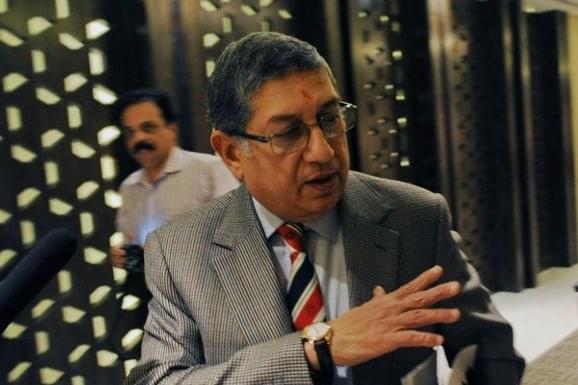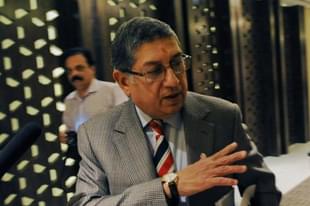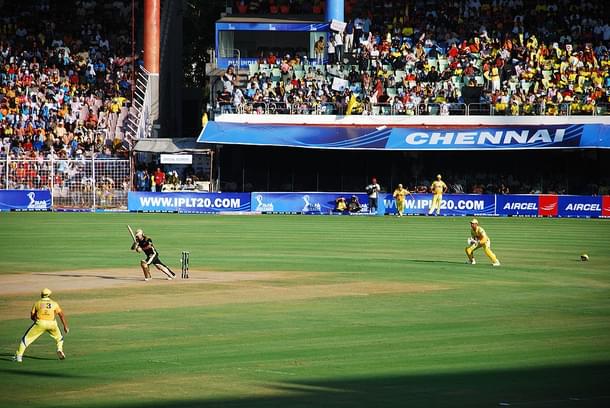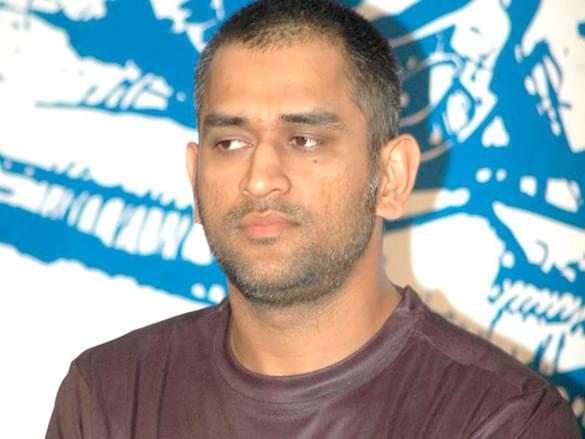Politics
All the BCCI President’s Men
Sagnik Chakraborty
Dec 02, 2014, 06:34 PM | Updated Feb 10, 2016, 05:08 PM IST
Save & read from anywhere!
Bookmark stories for easy access on any device or the Swarajya app.


The Supreme Court of India has spoken on Narayanaswami Srinivasan. He’s got to go. And ditto for his team, the Chennai Super Kings. A quick recap of the twists and turns of the biggest cricketing controversy.
It was the middle of May 2013. In what was then a bolt from the blue, IPL Season six was haunted by the spectre of spot-fixing. Even as three players from the Rajasthan Royals team—S. Sreesanth, Ajit Chandila and Ankeet Chavan—were arrested by the Delhi Police for receiving money from bookies in return for conceding runs in particular overs, Srinivasan, BCCI president and owner of the Chennai Super Kings franchise, almost shrugged off the issue. A few “bad eggs” could not spoil the game’s image—that was his opinion then.
The number of “bad eggs” has only multiplied since then, with the worst fears of any cricket lover in India, slowly but steadily, coming true. The BCCI president’s own lapses, by omission as well as by commission, have first been alleged, then come to light, next investigated by the SC-appointed Mudgal Committee and now been endorsed by the highest court of the land.
One and a half years down the line, it is utter mayhem unfolding. In June this year, Srinivasan had to “step aside” from his coveted post as BCCI President. Now, in its ruling on 27 November, the Supreme Court has barred him from running for any post in the governing body for cricket until further judgements, and called for the scrapping of the Chennai Super Kings (CSK) team from the IPL. Meanwhile, the Mudgal Committee report has indicted his son-in-law and the CSK Team principal, Gurunath Meiyappan, and also IPL Chief Operating Officer Sundar Raman in the betting and spot-fixing scandal.
The tip of the iceberg
Let us rewind to mid-2013. Even as the tainted trio of Sreesanth, Chandila and Chavan confessed to their crime of spot-fixing in the custody of the Delhi Police (Sreesanth later claimed that his confession was under duress), there were apprehensions that this was just the tip of the iceberg.
These apprehensions were soon to be proven true.
In a few days, it was the turn of Gurunath Meiyappan and Vindoo Dara Singh to be arrested, this time by the Mumbai Police. Meiyappan, Srinivasan’s son-in-law, was till then omnipresent in the CSK dressing room and dug-out. The charges against him were serious. He had allegedly been betting in the IPL, had lost about a crore and had leaked team information to bookies in order to make up for his losses.
In order to distance CSK from Meiyappan, Srinivasan was quick to dub him merely “an enthusiast” who “accompanies the team”. This laughable lie was duly exposed by Meiyappan’s official IPL ID card that clearly stated him to be the ‘Team Principal’ of the franchise and the fact that till date he had been actively participating in IPL auctions and bidding for CSK.
The charges against Vindoo Dara Singh were of facilitating the betting and fixing. He was allegedly the go-between in this cricketer-bookie nexus and got his regular percentage as commission.
Another person who was named as a “wanted accused” was Pakistani umpire Asad Rauf who had allegedly abused his on-field position to influence the direction of matches. Subsequently, ICC barred him from officiating in the Champions Trophy.
CSK was not the only IPL franchise that came under the investigating lens. In June 2013, it was the turn of Rajasthan Royals (RR), the champions of the inaugural version of the IPL, with its owner Raj Kundra being called in for questioning by the Delhi Police. Shortly thereafter, the RR co-owner was suspended from the IPL in order to avoid further embarrassment.

The Justice Mudgal Committee
Following the involvement of an increasing number of influential people in the betting scandal, Indian cricket was never going to be the same again. In October 2013, the Supreme Court appointed the Mudgal Committee under retired SC judge Mukul Mudgal to look into the entire scandal and provide an in-depth perspective. In February this year, the committee submitted its report to the SC in a closed envelope (Its findings were to reveal shocking details later).
It was during the next hearing in the very next month that the SC made a scathing observation that Srinivasan continuing as BCCI president was a “nauseating” affair; the apex court ordered him to step down immediately or be sacked.
However, what was nauseating for everyone else and also bluntly asserted by the apex court was apparently not so for Srinivasan. Not too keen to let go of power so easily, he declared that he was going to “step aside”—as opposed to “step down”—so that he could be back as Board President in the not-too-distant future.
Unfortunately for him, it was not going to be so.
(Mad?) Hatters of Indian cricket
What has become the stuff of lore now, with the unfolding of the IPL betting imbroglio, was always an open secret among those who took a keen interest in cricket, especially Indian cricket. Srinivasan’s role as BCCI President was always a questionable one. It went against all propriety, if not legality as well.
It was a simple case of conflict of interest.
Srinivasan was wearing two hats all this while. The post of the BCCI President was clearly incompatible with his being Vice Chairman and Managing Director of India Cements, the company that owns the Chennai Super Kings franchise. The IPL being a league run by the BCCI simply could not have a team that was headed by its President. It was this juggling of two hats that had raised the eyebrows of many, among ex-cricketers as well as the common cricket lovers.
Another person who has drawn a lot of unwanted attention as well as criticism for his inability to stand up to the malpractices and rampant corruption in Indian cricket is ‘Captain Cool’ Mahendra Singh Dhoni. He has been wearing three hats of conflicting interests—that of the Indian captain, the CSK captain and also a Vice-president of India Cements—and has attracted a lot of avoidable criticism. The lowest point of Dhoni’s cricketing career perhaps came when he testified on oath to the Mudgal Committee that Meiyappan was not a CSK team official.
This has been proven to be a lie now; MSD clearly committed perjury.
Not only this, Dhoni had even gone on to say that he had “rarely” met Meiyappan outside the cricketing field. This, too, has now been all but established as a misrepresentation of truth.

But then, conflict of interest seems to have been an essential attribute of CSK. In February 2008, Krishnamachary Srikkanth, the former Indian opening batsman, was named as “ambassador” of CSK. Seven months later, he was appointed by BCCI as Chief Selector of the Indian cricket team. His son Aniruddha Srikkanth played for CSK.
Srikkanth’s tenure as Chief Selector ended in 2012. Interestingly, so too did his CSK ambassadorship. In December 2012, he became “mentor” of the Sunrisers Hyderabad franchise owned by Kalanithi Maran of the Sun TV television network.
Deep rot
Thus far, the committee has named four highly influential individuals in its report:
1. N Srinivasan: Though acquitted of charges of being involved directly in any betting or fixing-related activities, Srinivasan has been charged of having had knowledge of a player being involved in misconduct and doing nothing about it. He is, therefore, guilty by omission.
2. Gurunath Meiyappan: He has been charged of involvement in betting. He has also been confirmed as a top CSK official, busting the “enthusiast” myth.
3. Sundar Raman: The IPL COO has been charged of being in contact with bookies and not acting against Meiyappan and Kundra, despite being intimated about their illegal activities.
4. Raj Kundra: The co-owner of the RR franchisee has being charged of betting through bookies.
In order to keep the 2014 edition of IPL free from controversy, the SC had appointed Sunil Gavaskar as interim BCCI chief for IPL Season seven. The cricketing legend was relieved of his duties at the end of the tournament. However, the deep rot from IPL six is far from having been dealt with. The BCCI has declared that it will defend Sundar Raman in court. It is not expected of Srinivasan to act gracefully either; his past record shows that he never has.
As of now, the SC has stated unequivocally that Srinivasan cannot have his cake and eat it, too; he must choose between his plum BCCI post and his ownership of CSK. Apart from that, the apex court has also directed CSK to be scrapped from the IPL. On the other hand, propriety demanded that Dhoni either gave up his Team India captaincy or his skipper’s role at CSK. Sources close to Dhoni have recently indicated that he is keen on continuing as the Indian skipper and relinquish his other role. Too late, Captain?
After this fiasco of epic proportions, the cricketing universe can never be the same again. The biggest casualty of this imbroglio is most certainly the credibility of the game of cricket. Now onwards, every unexpected twist and turn in ‘the game of glorious uncertainties’ will be looked upon with suspicion.
That, perhaps, is the biggest tragedy of it all.
Sagnik Chakraborty is a writer/ editor based in Hyderabad




